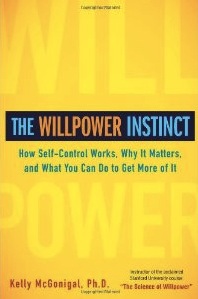

Unless you were packed off to a British boarding school at the age of seven, or have military training, or live in a monastery, there’s a good chance you struggle with self-discipline. Fortunately, studies have found that willpower (as well as such related cognitive functions as working memory and attention) can be strengthened through training. For those eager to perfect themselves, we recommend The Willpower Instinct: How Self-Control Works, Why It Matters, and What You Can Do to Get More of It. The author, Kelly McGonigal, is a Stanford University psychologist who teaches a course on the topic. After procrastinating for several months, we appealed to McGonigal for advice in putting her willpower-cultivating strategies into practice.
Problem: You have an idea for an invention that will give those geniuses at Google a run for their money, but instead of waking up early to work on it, you end up sleeping the day away.
Solution: Look to the future. Research shows that imagining the consequences of our choices can fortify resolve. For this reason, McGonigal suggests: “Write a letter to your future self describing the consequences of this amazing thing you want to which you want to commit.”
Problem: You forsake the practice of mindful eating every time you clap eyes on a piece of chocolate.
Solution: Cool down your prefrontal cortex, the brain structure that monitors self-control, and apply the 10-Minute Rule. “Tell yourself, I’m totally allowed to eat that chocolate, but I’ll do it in ten minutes,” McGonigal urges. “Then really pay attention to the experience of wanting. Are you panicking? Do you feel you’ll never be able to stop at one piece? Often when you pause and see what’s happening, a different impulse will arise.”

Problem: You are addicted to Downton Abbey and find yourself glued to the TV when you should be completing a blog post on self-discipline.
Solution: Unplug the TV and get to work. “Realize that these shows are created to reel you in; once you start watching them, you’ll never spontaneously feel like stopping,” says McGonigal. “Don’t expect some internal satiation cue to kick in, because it won’t.” As for that thing you’re meant to be working on, she recommends “shrinking the size of the commitment” to make it less daunting. “Remove the barriers to getting started, then take the smallest possible step toward what you want to accomplish.” She adds that in the beginning, even five minutes of effort can be enough to kick your brain into gear.
And if, in spite of these tips, your old habits gain sway, resist the urge to give yourself a good scolding. According to McGonigal, research suggests that the best cure for a failure of will isn’t self-criticism but (surprise!) self-forgiveness and compassion.




1 Comment
Karen Coccioli
I agree with the suggestions that Kelly McGonigal offers but I would add that oftentimes, what people perceive as not having will power is really fear of failure (and sometimes, fear of success). I find that I have to first identify the fear and acknowledge to myself that it is okay to be afraid. Recognize I am not holding back due to laziness, and consequently, I find that I can move with more ease and determination toward the steps required to complete my goal.